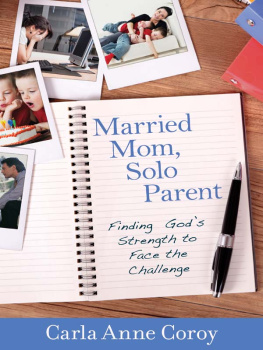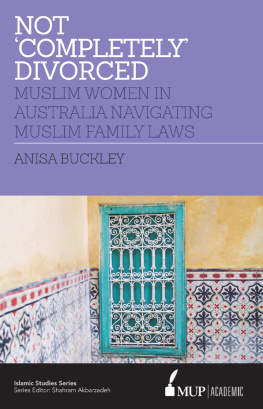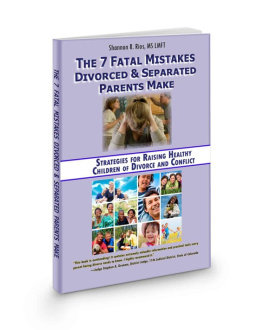FOR RICHER, FOR POORERPERSPECTIVES ON GENDER
Series Editor:
Myra Marx Feree, University of Connecticut
Pleasure, Power, and Technology:
Some Tales of Gender, Engineering, and the Cooperative Workplace
Sally Hacker
Black Feminist Thought:
Knowledge, Consciousness, and the Politics of Empowerment
Patricia Hill Collins
Understanding Sexual Violence:
A Study of Convicted Rapists
Diana Scully
Maid in the U.S.A.
Mary Romero
Feminisms and the Womens Movement:
Dynamics of Change in Social Movement Ideology and Activism
Barbara Ryan
Black Women and White Women in the Professions:
Analysis of Job Segregation by Race and Gender, 19601980
Natalie J. Sokoloff
Gender Consciousness and Politics
Sue Tolleson Rinehart
Mothering:
Ideology, Experience, and Agency
Evelyn Nakano Glenn, Grace Change, and Linda Rennie Forcey (editors)
Published in 1995 by
Routledge
Taylor & Francis Group
711 Third Avenue
New York, NY 10017
Published in Great Britain by
Routledge
Taylor & Francis Group
2 Park Square, Milton Park
Abingdon, Oxon OX14 4RN
Routledge is an imprint of the Taylor & Francis Group, an informa business
Copyright 1995 by Demie Kurz
All rights reserved. No part of this book may be reprinted or reproduced or utilized in any form or by any electronic, mechanical, or other means, now known or hereafter invented, including photocopying and recording or in any information storage or retrieval system, without permission in writing from the publishers.
Library of Congress Cataloging-in-Publication Data
Kurz, Demie.
For richer, for poorer : mothers confront divorce / Demie Kurz.
p. cm. (Perspectives on gender)
Includes bibliographical references and index.
ISBN 0-415-91008-0 (alk. paper). ISBN 0-415-91009-9 (pbk. : alk. paper)
1. Divorced womenUnited StatesPsychology. 2. Divorced womenUnited StatesSocial conditions. 3. Divorced mothersUnited StatesPsychology. 4. Divorced mothersUnited StatesSocial conditions. 5. Separation (Psychology) I. Title. II. Series : Perspectives on gender (New York, N.Y.)
HQ834.K87 1995
CIP
I wish to thank the many people who made possible the research project, The Status of Child Support in Philadelphia: Effects on Women and Children, which was the basis for this study of divorced women. This research was funded by a generous grant from the Pew Charitable Trusts to Women In Transition and was conducted by the Philadelphia Health Management Corporation. I also thank the Research Foundation of the University of Pennsylvania for funds to carry out parts of the data analysis.
The idea to do a research project on divorced women and their access to child support originated with Women In Transition, an organization widely recognized for the excellence of its programs, which provide counseling and training for many women, including divorced women. Former director, Lynne McMahon, hoped that research on divorced women and the child support process would help our understanding of how divorced women can obtain the resources to which they are entitled. Women in Transition along with Womens Law Project had developed a Child Support Project to inform, assist, and train divorced women trying to obtain child support. Lynnes successor, Roberta Hacker, the current director of Women in Transition, continued to support this research project on divorced womens access to resources.
I am very happy to have been associated with the Philadelphia Health Management Corporation (PHMC), where the research was carried out. Under the able leadership of its president, Richard Cohen, and Senior Vice-President, John Loeb, PHMC has made significant contributions in many health-related areas through its unique combination of health research, policy development, and health-delivery programs. The leadership of PHMC provides an atmosphere that is not only highly professional, but stimulating and supportive. Many fine people work at PHMC, including Lynne Kotranski, director of the research and evaluation division, and Kris Olsen, former director of that division.
I was most privileged to have Kathleen Coughey as co-principal investigator on the grant which funded this research. Kathleen was a wonderful colleague, whose knowledge of divorce issues enriched the project at all stages. We spent many hours together designing the research, discussing the situations of the mothers we interviewed, and hoping for a time when things would be better for divorced women. Kathleen also did extensive data preparation.
I also wish to acknowledge Womens Law Project which, along with Women in Transition, developed the Child Support Project to inform, assist, and train divorced women trying to obtain child support. Womens Law Project, whose current director is Carol Tracy, continues to do excellent work counseling women on child support and other issues related to divorce. Dabne Miller expertly directs the hotline which assists divorced women and others in negotiating for child support and other resources to which they are entitled.
My colleagues in Womens Studies at the University of Pennsylvania, Carroll Smith-Rosenberg, Janice Madden, and Luz Marin, gave me valuable moral support. Sociology Department colleagues, Elijah Anderson, Jerry Jacobs, and Robin Leidner, read parts of this manuscript and gave me helpful feedback and encouragement, as did Barbara Woodhouse of the Penn Law School. Michelle Fine of CUNY Graduate Center and Vicki Smith of the University of California at Davis also read parts of the manuscript and offered welcome suggestions. I am grateful to Ann Freedman for her patience in explaining legal issues to me and for making excellent suggestions regarding parts of the manuscript. Dabne Miller provided valuable comments on the child support system, and an anonymous reviewer made some very good points about an earlier draft.
I want to thank Tanya Koropeckyj-Cox for doing an excellent job preparing the tables for this book and for offering invaluable suggestions about the data analysis and the findings. Barbara Goldoftas provided superb editing, and Myra Marx Ferree, the editor of the Perspectives on Gender series, made astute suggestions for improving the manuscript. Jayne Fargnoli, Sociology Editor at Routledge, was very supportive throughout the publication process, as were friends David Kairys and Mary Anne Layden. Xan Griswold provided cheerful and expert help in preparing the manuscript at a critical juncture, and Jennifer Fields and Christine Min helped with last minute book preparation. Of course none of these people are responsible for any errors in the findings or their interpretation.
My family has provided essential and loving support. My husband Bruce always believed in the project, was there to talk about the issues, and helped make sure I could finish the book. With great skill he cheerfully kept our family life going when I was buried in data. Our sons Ethan and Joshua, always lively, interesting, and fun, generously gave me sympathy and support. Thanks also to friends at Taylors Lane, to Julie Forsythe and all the folks at Small Meadows, and to other members of my family for just being there.







